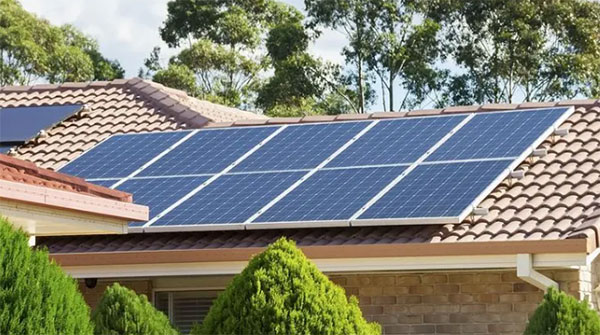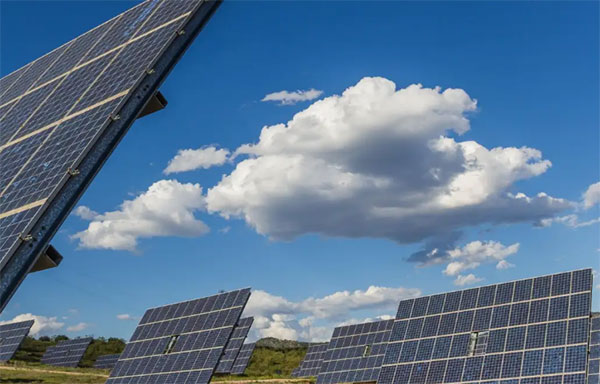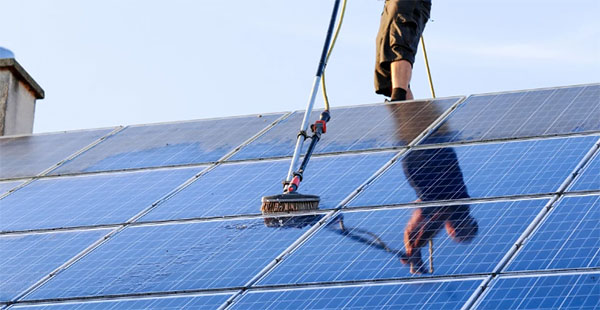Description
Solar panels can increase a home's value, appealing to eco-conscious buyers and offering long-term energy savings.

Market Trends and Solar Panel Popularity
The solar panel market has witnessed a significant surge in recent years, driven by heightened environmental awareness and advancing solar technologies. This upswing is not just a passing trend but a substantial shift in the real estate landscape, as more homeowners and buyers prioritize energy efficiency and sustainability.
Current Demand for Solar-Equipped Homes
Homes equipped with solar panels are increasingly in demand, especially in areas where green living is a prominent lifestyle choice. The key driver behind this demand is the growing consciousness about reducing carbon footprints and the long-term financial savings solar panels offer. For instance, a typical residential solar panel system can generate about 5kW to 10kW of power, enough to significantly reduce electricity bills. The quality of solar panels, often determined by their efficiency and lifespan, which can range from 20 to 25 years, is a critical factor for potential buyers.
Regional Variations in Solar Panel Value
The value added by solar panels to a property varies significantly across different regions. In sun-rich states like California and Arizona, solar panels can increase a home's value by over 4.1%, translating to an additional $24,000 for a $600,000 home. In contrast, regions with less sunlight or higher installation costs may see a lesser increase in property value. Factors such as the size and specifications of the solar panel system, the cost involved in installation (typically ranging between $15,000 to $25,000 before tax credits), and local solar incentives play a crucial role in determining the added value.

Cost vs. Value Analysis
Delving into the financial aspects of solar panel installation and the long-term benefits it offers provides a clearer picture for homeowners considering this eco-friendly investment. Understanding the initial costs and long-term value is crucial in making an informed decision.
Installation Costs of Solar Panels
The upfront cost of installing solar panels is a vital factor for many homeowners. This cost varies widely based on factors such as the system's size, the type of solar panels used, and installation charges. On average, the installation of a standard 6kW solar panel system in a residential property can range from $15,000 to $25,000. However, these costs are often offset by federal tax credits and local incentives, which can reduce the initial expense by up to 26%.
Solar panels come in various types, with monocrystalline panels being more efficient but also more expensive, costing around $1 to $1.50 per watt. In contrast, polycrystalline panels are cheaper, priced at about $0.90 to $1 per watt, but they offer lower efficiency. The choice of materials directly impacts both the cost and the efficiency of the solar panel system, with higher-efficiency panels providing more energy savings over time.
Long-Term Financial Benefits for Buyers
The long-term financial benefits of solar panels are significant.
A key advantage is the substantial reduction in electricity bills. For example, a solar panel system that produces 10kW can generate enough energy to significantly cut down or even eliminate electricity costs, depending on the household's energy consumption and local sunlight availability.
Another important aspect is the increase in property value. Studies have shown that homes with solar panels sell for a premium, often around 4.1% higher than similar homes without solar panels. This translates into a potential increase of $20,000 to $30,000 in the home's value, depending on the region and the housing market.
The lifespan of solar panels further adds to their value. Most solar panels come with a warranty of 20 to 25 years, ensuring long-term performance. Additionally, advancements in solar technology are continuously improving the efficiency and durability of panels, enhancing their long-term value proposition.

Impact on Property Value
Exploring the impact of solar panels on property value reveals how this green technology is reshaping the real estate market. The inclusion of solar panels on a property not only reflects a commitment to sustainable living but also offers a tangible increase in property value.
Comparative Market Analysis: Solar vs. Non-Solar Homes
When comparing solar-equipped homes to those without solar panels, several key factors emerge:
- Property Value Increase: Homes with solar panels often see an increase in value. On average, solar homes can fetch a premium of about 4.1% more than similar homes without solar installations. This percentage translates into an added value of approximately $20,000 to $30,000 for a median-valued home.
- Energy Efficiency: The efficiency of solar panels, typically ranging between 15% to 20%, directly affects a home’s appeal to energy-conscious buyers. Higher efficiency panels lead to greater energy savings, making the property more attractive.
- Market Demand: In regions with high electricity rates and favorable solar conditions, such as California and Arizona, the demand for solar-equipped homes is significantly higher, further driving up property values.
Case Studies: Resale Value Increase
Several case studies highlight the increase in resale value for homes with solar panels:
- A study in San Diego showed that homes with solar panels sold for 6% more than comparable homes without solar.
- In New Jersey, a similar study found a 4.4% increase in resale value for homes with solar installations.
- A nationwide study indicated that homes with a standard 6kW solar system enjoyed an average increase in resale value of $24,000.

Buyer Perception and Preferences
Understanding buyer perception and preferences towards solar panels is crucial for homeowners and real estate professionals. As solar technology becomes more prevalent, its impact on buyer decisions is increasingly significant.
Survey Results on Solar Panel Appeal
Recent surveys have shed light on how potential homebuyers view solar panels:
- Preference for Solar-Equipped Homes: A significant percentage of homebuyers show a preference for homes with solar panels. Approximately 80% of respondents consider solar panels an attractive feature due to their potential for energy savings and environmental benefits.
- Willingness to Pay a Premium: About 70% of potential buyers are willing to pay more for a home with solar installations, recognizing the long-term financial and environmental advantages.
- Energy Efficiency as a Key Factor: Energy efficiency ranks high in homebuying considerations, with solar panels being a definitive factor for many.
Environmental Considerations in Buyer Decisions
Environmental factors play a pivotal role in the decision-making process for many buyers:
- Reduction in Carbon Footprint: Buyers are increasingly conscious of their environmental impact, with many seeking homes that contribute to a lower carbon footprint.
- Sustainable Living: Homes with solar panels are seen as a step towards sustainable living, attracting buyers who prioritize eco-friendly lifestyles.
Comparison Table: Solar vs. Non-Solar Home Preferences
| Criteria |
Solar-Equipped Homes |
Non-Solar Homes |
| Energy Savings Potential |
High, due to reduced electricity bills |
None |
| Environmental Impact |
Positive, with reduced carbon emissions |
Neutral/Negative |
| Long-term Financial Benefit |
High, due to energy savings and increased property value |
None |
| Aesthetic Appeal |
Varies, generally viewed positively |
Neutral |
| Initial Investment Cost |
Higher due to installation costs |
None |
| Market Demand |
Increasingly high, especially in eco-conscious regions |
Standard |
Marketing Strategies for Solar-Equipped Homes
Effective marketing strategies are essential for showcasing the unique value proposition of homes equipped with solar panels. These strategies not only highlight the home's features but also align with the values and priorities of potential buyers.
Highlighting Energy Efficiency in Listings
When marketing solar-equipped homes, emphasizing energy efficiency is key:
- Detailing Energy Savings: Include specific information about the solar system’s capacity, such as its power output (typically ranging from 5kW to 10kW for residential systems) and the potential reduction in electricity bills. For instance, a 7kW system can save up to $2,000 annually on electricity bills, depending on local rates and sunlight exposure.
- Certifications and Warranties: Highlight any energy certifications the home has received and provide details on the solar panel warranties, which typically last 20 to 25 years, ensuring long-term value.
- Solar Incentives: Mention local solar incentives or tax credits that can benefit the buyer, adding value to the purchase.
Targeting Eco-Conscious Home Buyers
Tailoring the marketing approach to attract eco-conscious buyers involves several strategies:
- Sustainable Lifestyle Promotion: Emphasize how the solar panels contribute to a sustainable and environmentally friendly lifestyle. This can appeal to buyers who prioritize reducing their carbon footprint.
- Community and Environmental Impact: Showcase any community-wide benefits of solar panels, like reducing the neighborhood's overall carbon emissions.
- Visual Appeal: Use high-quality images and virtual tours to visually demonstrate the integration of solar panels with the home’s aesthetics.
Key Points to Highlight in Marketing Materials:
- Cost Savings: Boldly emphasize the long-term cost savings from reduced utility bills.
- Environmental Benefits: Clearly articulate the environmental advantages of solar panels.
- Modern Technology: Showcase the modernity and technological advancements of the solar panel system.

Post-Installation Considerations
After installing solar panels, homeowners and potential buyers should be aware of the ongoing maintenance requirements, warranty details, and considerations for future upgrades. These factors play a crucial role in the long-term value and performance of the solar panel system.
Maintenance and Warranty Transfer
Regular maintenance and understanding warranty transfers are essential for the longevity and efficiency of solar panels:
- Routine Maintenance: Solar panels require minimal maintenance, primarily involving regular cleaning to remove dust and debris and periodic checks to ensure panels are functioning optimally. For most systems, an annual inspection is recommended to maintain peak performance.
- Warranty Details: Solar panel warranties typically last between 20 to 25 years. It's crucial to understand the specifics of the warranty, including what it covers (such as performance, parts, and labor) and the process for transferring the warranty to a new homeowner if the property is sold.
Solar Panel Upgrades and Technology Lifespan
Staying updated with technological advancements and considering potential upgrades is vital:
- Technological Advancements: Solar technology is continuously evolving, with improvements in efficiency and aesthetics. Homeowners should stay informed about new developments that might enhance their system's performance or reduce costs.
- Upgrading Solar Panels: While solar panels have a long lifespan (often over 25 years), future upgrades can be considered to take advantage of more efficient or aesthetically pleasing options. When upgrading, factors such as the cost of new panels, the increased efficiency they offer, and the compatibility with the existing system should be considered.








